Brother Tells His Sister to Leave Their Family Dog Behind If They Want to Temporarily Move Into His House
There are some problems that hit too close to home. This is when an outsider's perspective can be valuable to shed light on issues that may be obscured by biases and personal feelings involved.
Reddit is the perfect place to gain someone else's point of view without revealing too much about yourself. This OP stated that Reddit is the last place he would go for advice, but he has seen the Am I The A**hole sub work for others before and thought he would give it a shot.
He and his younger sister recently had a disagreement over a dog. OP's younger sister and her family had to sell their house seven months ago due to unforeseen financial struggles.
They have been staying with OP's mom since then. They have been living well enough together until OP received an email from his sister asking if they could stay at his house instead.
Apparently, she is tired of living with their mom because of her house rules. Their mom has assigned her the task of cleaning the house, and their TV time is limited to a few hours.
OP was willing to let his sister and her family stay at his and his wife's house for a while, but he didn't want them to bring their German Shepherd dog. The dog was adopted from a shelter two years ago, but he is untrained.
The dog chews on furniture and barks a lot, which OP believes will be a problem.

OP called his sister and said that if they wanted to stay at his house, they couldn't bring the dog with them.

OP's sister got annoyed and told OP that the dog was her only comfort, and her kids adore it.
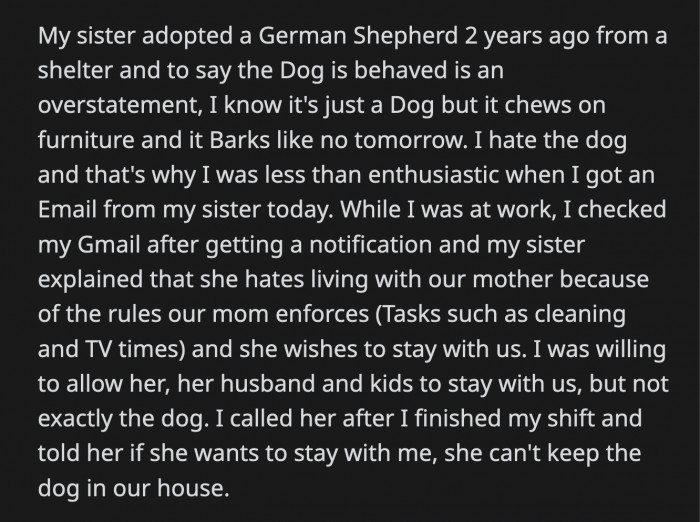
The Role of Pets in Family Dynamics
Dr. Linda Johnson, a family therapist, explains that pets often play significant roles in family cohesion and emotional support.
When a family member feels pressured to abandon a pet, it can create feelings of loss and rejection.
Research shows that pets can serve as emotional anchors for families, providing comfort during transitions or stress, making their removal particularly poignant.
She then cried and put her husband on the phone, who told OP he was making a simple situation complicated. Did OP behave like a jerk and ask for too much?

Was OP's condition too harsh?

OP understands how much his sister loves the dog, but he is not a dog person. OP doesn't like dogs at all.

Studies in animal therapy highlight the psychological benefits pets provide, including reduced anxiety and increased feelings of belonging.
When families experience stress, such as moving or changing living arrangements, the presence of a pet can facilitate emotional regulation.
Thus, suggesting the abandonment of a family pet can exacerbate stress and feelings of instability.
He would definitely be the a**hole if he hurt dogs.

OP says he is not abusive to dogs; he just doesn't want them in his home.

They may be family to their owners, but to others, they are just animals.

Navigating Conflicting Family Needs
In navigating situations where family needs conflict with pet ownership, effective communication is key.
Psychologists recommend discussing the emotional significance of the pet openly, emphasizing how it contributes to family well-being.
Engaging in family meetings can help facilitate these conversations, allowing everyone to express their thoughts and feelings without judgment.
OP dug in his heels and reaffirmed that he cannot deal with dogs and the mess they make.

OP's sister sounds like the worst kind of roommate you can imagine.
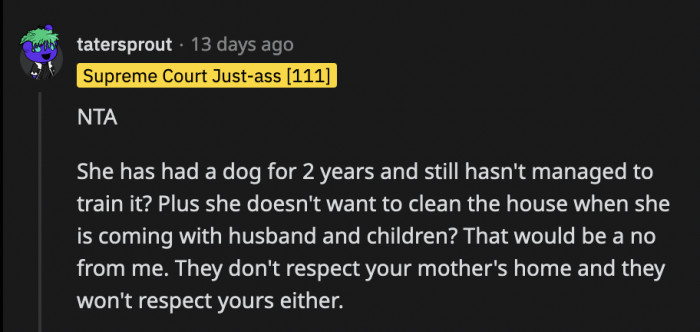
Good for them for focusing on their kids and jobs first, but that means the dog is not given enough time, which makes OP's sister an irresponsible dog owner.

Furthermore, incorporating problem-solving strategies can help families find compromises that honor both the needs of the household and the pet.
Research indicates that collaborative approaches to conflict resolution can yield more sustainable outcomes.
According to findings in the Journal of Family Psychology, families that engage in collaborative decision-making report higher satisfaction and cohesion.
OP did ask his wife what her thoughts were on this, and she agreed that the dog is an issue. She only agreed to temporarily take the family in as long as they promised to find their own place soon.

OP's wife will handle most of the house chores if his sister is this against cleaning and following the homeowner's rules.

"Are your sister and brother-in-law better parents than they are dog owners?" Perfect question.
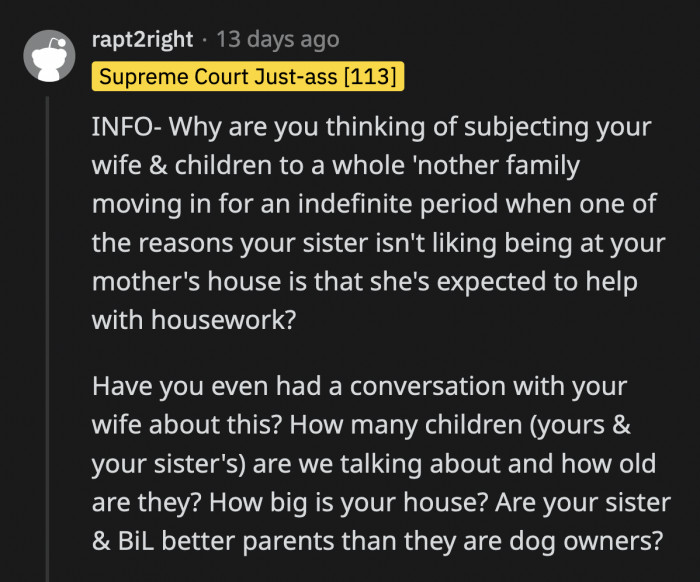
OP says he can't judge whether his sister is a good or bad owner. He just doesn't want the dog in his home and wonders if he's an a**hole for setting that boundary.

Whether the dog is trained or not, OP still wouldn't want it in his house since he doesn't like dogs at all.
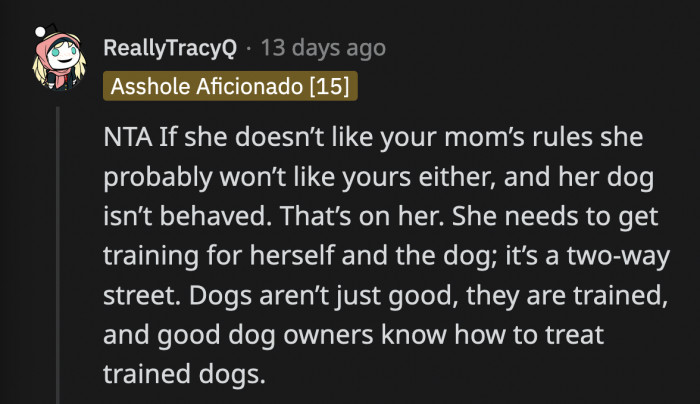
OP offered his home, but with this condition, she has no chip to bargain with since she's the one asking OP for a favor.
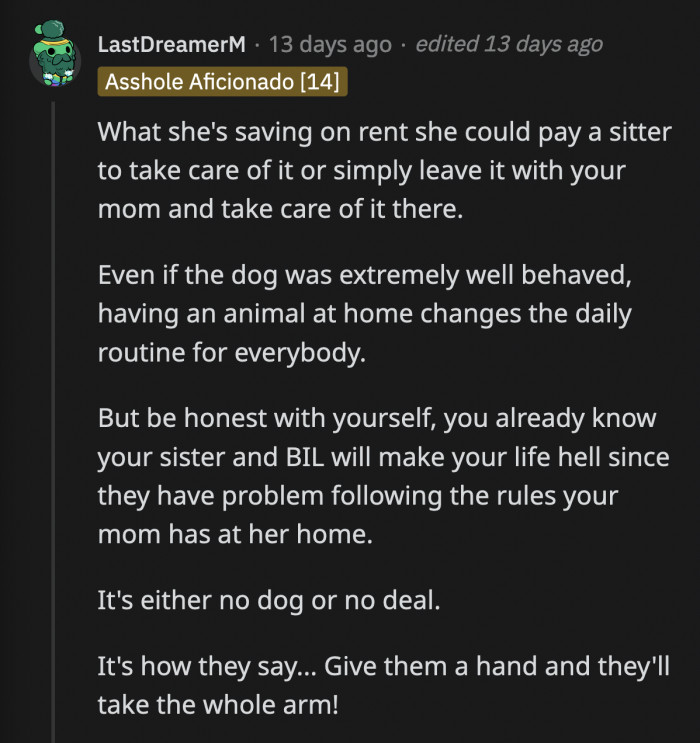
OP is justified in telling his sister not to bring her dog if they want to move into his house. They needed his help, and this is the one non-negotiable request OP has.
They can either continue staying with their mom or lose the dog to live with OP. He and his family have no obligation to adjust their preferences to make room for a dog they didn't want in the first place.
Psychological Analysis
This situation illustrates the deep emotional connections families have with their pets.
Understanding these dynamics is crucial for fostering healthy family relationships and addressing conflicts with empathy and understanding.
Analysis generated by AI
Analysis & Alternative Approaches
Ultimately, the decision to keep or rehome a family pet should involve consideration of the emotional bonds shared within the family.
Psychologists stress the importance of maintaining open lines of communication to navigate these complex situations.
By working together, families can find solutions that respect the needs of both the human and animal members.



